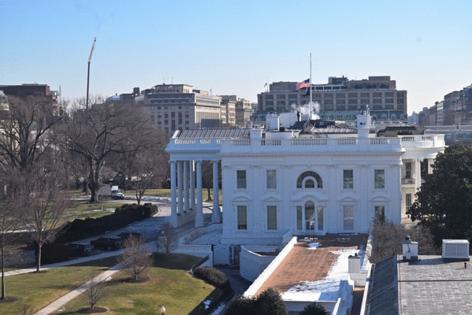Editorial: A federal republic -- New York and other states can't be conscripted for Trump's purposes
Published in Political News
Not content to deploy his immigration agents nationwide, President Donald Trump is attempting to force states and localities to join in his crackdown, having the Justice Department sue the state of Illinois and the city of Chicago over their sanctuary policies and getting the Department of Transportation, among potentially other federal agencies, to threaten to withhold federal funds to jurisdictions with sanctuary policies.
Under long-standing federalist principles, the federal government can’t co-opt state law enforcement, but Trump doesn’t care about this.
Under our system of government, Uncle Sam has certain enumerated powers and the states have all other powers under the Tenth Amendment. While the U.S. Constitution does have the supremacy clause, meaning federal law prevails over conflicting state law, in many areas the different levels have different responsibilities. Immigration enforcement has long been a federal role. Now it will also be a state role? Because Trump says so?
Hypocrisy and shame have never been particular deterrents for Trump and his political movement, but that doesn’t make it not worth pointing out that the proto-MAGA Tea Party and broader right-wing conservative effort has long held federalism and small government as unshakeable lodestars. Republicans called former President Barack Obama an emperor for using his executive power to, among other things, simply defer federal immigration enforcement against young Dreamers that were broadly popular.
However, now those same Republicans seem completely on board with a federal government directing states to enact the White House’s immigration enforcement agenda. Wasn’t this exactly the scenario that so many of these so-called constitutionalists claimed to fear and abhor?
Washington can’t just order the states around. It seems that they never really meant it sincerely. These folks are now perfectly fine with an autocratic president just as long as he is their guy, and as long as he goes after the people they think deserving of it.
As state lawmakers debate whether they will enact stronger protections for immigrants or go the other way in the direction of cooperation, they should think not in hypotheticals but in terms of what the Trump administration is doing right now. For all the concern over immigrants who might have committed crimes or are wanted on criminal charges, we should remember that there’s a mechanism to deal with this already: the criminal justice system. While states cannot substantially interfere in federal immigration enforcement, they don’t have to be deputized to carry out the commands of the feds.
Like much of the Trump agenda, this will be settled in the courts, ultimately ending up before the U.S. Supreme Court, where the separation of powers and the rule of law are supposed to be zealously protected. We hope it will be so.
But it is also on state and local officials to stand firm as to their rights and prerogatives, not just on immigration, but on everything. This is not a unitary polity, where the president decides for everyone, but 50 sovereign states that joined in union.
The phrase “state’s rights” has a bad taste from Southern efforts to avoid desegregation, but that was in defiance of a binding and unanimous Supreme Court decision in Brown vs. Board of Education that applied everywhere. That is much different than a decree or executive order from the president.
_____
©2025 New York Daily News. Visit at nydailynews.com. Distributed by Tribune Content Agency, LLC.




























































Comments